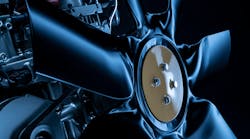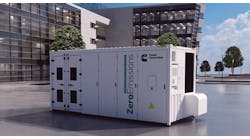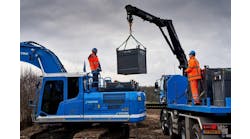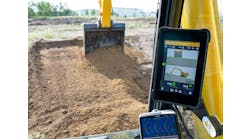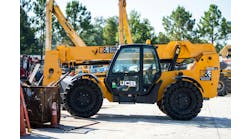Perkins Participates in Projects Supporting Low-Carbon Technologies
Perkins Engines Co. is participating in two projects under the U.K. Government’s ‘Red Diesel Replacement’ competition supporting low-carbon technologies, fuels and systems for the construction and quarrying/mining sectors. Building on a number of research and development activities improving power system efficiency while simultaneously minimizing environmental impact, these projects will further enhance the portfolio of technologies available to further reduce greenhouse gas emissions across the off-highway sectors.
Complementing already-announced technology offerings delivering hybrid solutions and efficiency improvements, these projects will help to advance Perkins engines' capability to operate on a range of lower carbon intensity fuel types as well as 100 percent hydro-treated vegetable oil to En15940 and biodiesel up to B202.
In one project Perkins is the lead organization in developing an internal combustion engine which runs on renewable Dimethyl Ether (rDME), working closely with Loughborough University and Flogas.
Dimethyl ether is a well-established, non-toxic aerosol propellant, which can be synthesised from biomass, residues, and waste, providing an opportunity for significant reductions and even net negative greenhouse gas emissions.
It has several fuel properties that make it attractive for use in diesel engines. It has a very high cetane number—which is a measure of the fuel's ignitibility in compression ignition engines—and the energy efficiency and power ratings of DME fuelled and traditional diesel engines are virtually the same.
DME’s sootless combustion can further reduce the particulate matter emissions from the current low levels seen with modern diesel engines to allow particulate mass and count limits to be achieved with simplified exhaust after-treatment.
As DME can use LPG infrastructure with minimal change, there is a clear existing and easily expandable supply chain infrastructure. Flogas and Loughborough University will provide a practical demonstration of both delivery and storage of DME as well as engine performance and capability.
Ammonia and hydrogen as fuels for decarbonizing heavy-duty engines
In another project, MAHLE Powertrain, Perkins, Clean Air Power and the University of Nottingham will demonstrate solutions based upon both ammonia and hydrogen as fuels for decarbonizing heavy-duty engines.
Hydrogen and ammonia powered engines have the capability to deliver zero tailpipe carbon dioxide emissions, aligned with the U.K.’s hydrogen strategy. By developing flexible fuel capability, the consortium will demonstrate combinations of fuels from dual fuel diesel with hydrogen and/or ammonia to pure ammonia or hydrogen.
These solutions can provide negligible tailpipe carbon emissions, while also maintaining local air quality. If sourced from green hydrogen, the full life cycle greenhouse gas emissions can be almost eliminated.
